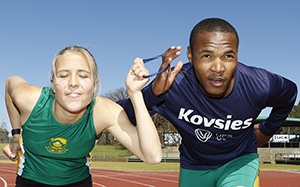
Louzanne Coetzee and Khothatso Mokone.
Photo: Charl Devenish
Behind every successful Paralympic athlete is a guide, and behind blind athlete Louzanne Coetzee is none other than former Kovsie student Khothatso Mokone.
Mokone, who is a sports journalist and freelance photographer, says he is not entirely sure that his busy schedule is very balanced, but he tries to ensure he squeezes as much as possible into his day. One thing he always makes time for is his training. “As a young person, I try to take every opportunity that comes my way,” he says.
This young runner, who has been Coetzee’s guide for the past eight months, says that every race they have run together thus far has always been better than the last. “The partnership grows harmoniously every day. We talk about almost everything there is, not only running,” Mokone says.
Mokone guided Coetzee in the 1 500m of the Paralympics in Rio de Janeiro in September this year when she was disqualified.
Mokone, who loves comedy and Dubai, is inspired by SAfm journalist and presenter Ashraf Garda. “He talks a lot about current issues that affect our country and I like his style of presenting. He is a good orator.”
Something people may not know about him is that he always walks around hopeful that the best is yet to come. “When I walk down the street, I walk with confidence and people think I have made it in life not knowing that I only have hope for a better tomorrow,” he says.
Although he is not yet as successful as he would like to be, Mokone encourages the youth to “open their eyes and ears to set realistic goals and work with patience to achieve each goal, whether short or long term”.